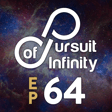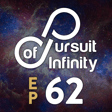
76. Metaphysics of the Soul and Consciousness
This is episode 76, where Joe and I delve back into our list of metaphysical questions, and I have to say, this might be our favorite segment yet. We explore fascinating topics like the existence and nature of the soul and the essence of consciousness—subjects we are especially passionate about. These big, thought-provoking questions lead to rich discussions, where we uncover new insights from our differing interpretations and beliefs. If you like these types of episodes, let us know wherever you listen, or reach out on our website.
_________________
Music By R-Production
Follow Pursuit Of Infinity:
www.PursuitOfInfinity.com
Discord: https://discord.io/pursuitofinfinity
YouTube: https://www.youtube.com/channel/UCPpwtLPMH5bjBTPMHSlYnwQ
Spotify: https://open.spotify.com/show/58he621hhQ7RkajcmFNffb
Apple Podcasts: https://podcasts.apple.com/ca/podcast/pursuit-of-infinity/id1605998093
Instagram: https://www.instagram.com/pursuitofinfinitypod/
X: https://twitter.com/PursuitInfinity
Patreon: Patreon.com/PursuitOfInfinity



















